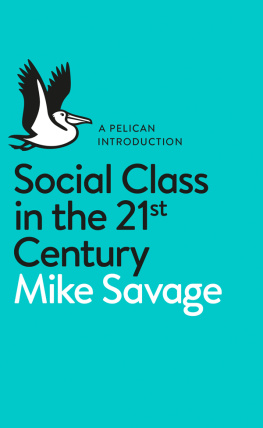Class in the New Millennium
Class in the New Millennium paints a fresh and comprehensive picture of social class in Britain today. Anchored in a broad repertoire of methods and pursuing a distinctive theoretical agenda, it not only painstakingly maps the structure, transformation and effects of the UKs key fault lines but goes behind closed doors to see how they play out in everyday family life.
Throughout the book Atkinson throws new light on a diverse array of themes, including: the continued effects of deindustrialisation, educational expansion, feminisation of the workforce and surging employment insecurity; the persistence of lifestyle cleavages despite cultural and technological change; the growth of political disengagement, the transformation of the Labour Party and the rise of nationalism; the entwinement of class with space, place and physical movement; and the way in which class interacts with intimate relations to shape not just the way we decorate our walls or talk over the dining table but the very reproduction of the class structure itself.
This innovative title will appeal to scholars as well as advanced undergraduate and postgraduate students interested in the fields of sociology, politics and political science, cultural studies, cultural geography, social policy and social work.
Will Atkinson is Reader in Sociology in the School of Sociology, Politics and International Studies at the University of Bristol, UK.
This book is essential reading for all those concerned about the state of social class in Britain. It builds on the work of Pierre Bourdieu to paint a nuanced and sophisticated picture of class in the new millennium. Richly theorised and beautifully written, it combines intensive ethnographic analyses with powerful conceptual insights which deepen and enrich readers understandings of class structure, effects and place in the UK today.
Diane Reay,Professor of Education, University of Cambridge, UK
The vision of class captured by Will Atkinson in this book advances in an essential way our understanding of how everyday life is constituted of multidimensional structures of differentiation. The significance and interrelation of national, local and domestic spaces are presented via attentive exploration of rich data from the Ordinary Lives Project. The wealth of skilfully produced empirical material is particularly well used in the attention to the subtle drama about possible futures entailed in expectations of class mobility.
Elizabeth B. Silva,Professor of Sociology, The Open University, UK
Based on extensive and finely analysed evidence, Atkinson takes a further impressive step in consolidating his distinctive sociological interpretation of the effects of class on the reproduction of British culture.
Alan Warde,Professor of Sociology, University of Manchester, UK
Class in the New Millennium
The Structure, Homologies and Experience of the British Social Space
Will Atkinson

First published 2017
by Routledge
2 Park Square, Milton Park, Abingdon, Oxon OX14 4RN
and by Routledge
711 Third Avenue, New York, NY 10017
Routledge is an imprint of the Taylor & Francis Group, an informa business.
2017 Will Atkinson
The right of Will Atkinson to be identified as author of this work has been asserted by him in accordance with sections 77 and 78 of the Copyright, Designs and Patents Act 1988.
All rights reserved. No part of this book may be reprinted or reproduced or utilised in any form or by any electronic, mechanical, or other means, now known or hereafter invented, including photocopying and recording, or in any information storage or retrieval system, without permission in writing from the publishers.
Trademark notice: Product or corporate names may be trademarks or registered trademarks, and are used only for identification and explanation without intent to infringe.
British Library Cataloguing-in-Publication Data
A catalogue record for this book is available from the British Library.
Library of Congress Cataloging in Publication Data
A catalog record for this book has been requested
ISBN: 978-1-138-64472-4 (hbk)
ISBN: 978-1-315-62861-5 (ebk)
Typeset in Bembo
by Out of House Publishing
Table of contents
Part I
Field analysis: the British social space and its homologies
Part II
Lifeworld analysis: class, place, family
Figures
Box
I have accumulated many debts of gratitude in the years it has taken to complete this book: to the British Academy and the ESRC (project no. RES-062-23-2477), of course, for funding the underpinning research projects; to staff at the Office for National Statistics; to Roger Stafford at NatCen; to my colleagues on the Ordinary Lives project, Harriet Bradley and Adam Sales; to all the many people who tried to assist with recruitment; and to the various audiences at conferences and workshops where early versions of some of the analyses contained herein were presented.
What is the state of class in Britain today? What to give this somewhat abstract query more concrete form is the shape of the nations class structure, and how has it changed since the economic upheavals of the 1980s? How does it feed into our most apparently private of desires and tastes in music, sports, books, what we do to our bodies, watch on television and so on not only setting us apart from others but setting up an order of worth in which some tastes are distinguished as legitimate and others as vulgar? In what ways has this mutated with entry into a new century supposedly characterised by choice, reflexivity and individualism? How does class orient our values and ethics, playing out in political attitudes, but also the degree to which we feel we even have a point of view worth articulating? And how has the neoliberal revolution that swept the world in the 1970s and 1980s played into that? How does class shape but also how is it shaped by the quotidian experience of space and place at the national, local and household level? How does it entwine with that specific bundle of relations we call family in so doing? How, finally, are childrens nascent and evolving class positions worked at through the most routine and prosaic, yet emotionally charged, objects and events of domestic life?
This avalanche of questions vexations to countless scholars before me I endeavour to answer in these pages, offering, as an end product, a novel vision of class, its effects and its place in everyday life in Britain for the new millennium. In so doing I mobilise the path-breaking and powerful view of what class is and how it works proffered by French sociologist Pierre Bourdieu in his magnum opus, Distinction (Bourdieu, 1984). Being rooted in a detailed analysis of his own country during les Trente Glorieuses, however, there have long been questions as to how far this perspective could be generalised to other Western nations and whether it still stood in the global age, the digital age, the age of the internet, late modernity, high modernity or whatever other appellation one wants to foist on the last thirty or forty years. Thus set in motion was a rapidly accelerating train of scholarship aiming to test the applicability of Bourdieus ideas in countries across the world. The UK was duly targeted as part of this, but in a way which, regrettably, overlooked some of Bourdieus core insights and, as a result, left far too many questions unanswered. Moreover, Bourdieu himself, for all his evident advances, neglected to situate class fully in relation to other social structures and influences shaping the mundane experience of the world, essential for making sense of how the determinations of class are actually perceived, felt and lived, so there is need for some further conceptual elaboration. All this will be expanded upon in what follows as a means of contextualising the analyses presented throughout this book, but let me first recount precisely how Bourdieu came to prominence in class analysis and challenged the conventional schools of thought.
Next page





